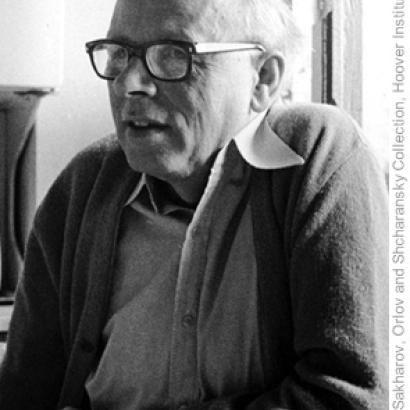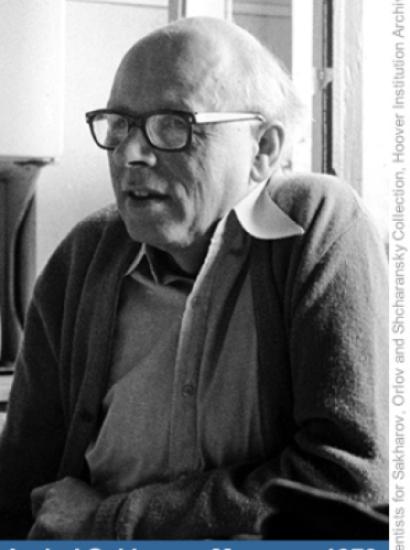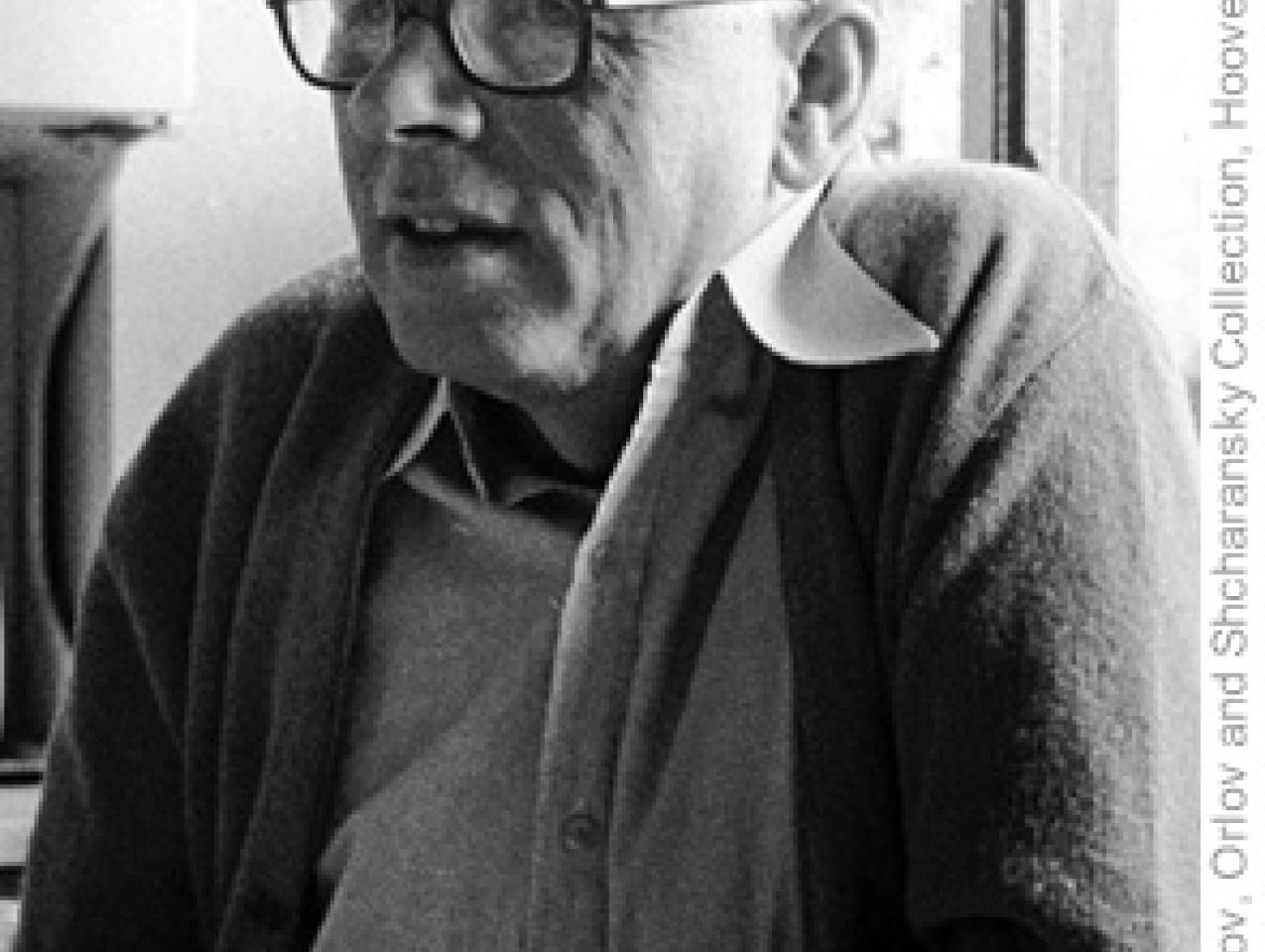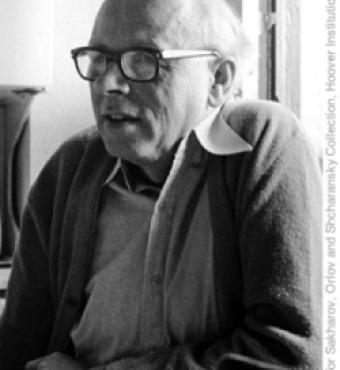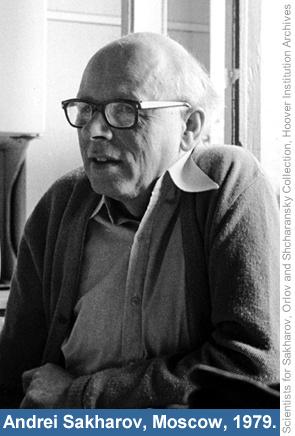- World
- Contemporary
- History
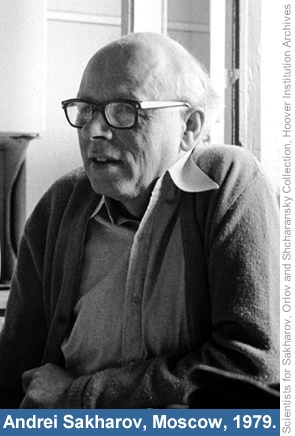
A review of The KGB File of Andrei Sakharov, edited by Joshua Rubenstein and Alexander Gribanov, and translated by Ella Shmulevich, Efrem Yankelevich, and Alla Zeide (Yale University Press, 2005).
The events of the long struggle in the Soviet Union between the despots and the “dissidents,” in which Andrei Sakharov played such a great role, were well described in his Memoirs, which appeared in English in 1990, and in the accounts of his valiant wife, Elena Bonner. But here we have the other side of the story: the long secret records kept by the KGB and submitted to the state and party leadership. And these documents are skillfully put into the larger context by an extensive and useful introduction by Joshua Rubenstein.
The tactics and the strategy of the campaign against Sakharov were organized in detail by Yuri Andropov, who was spoken of in the West as the most intelligent and progressive of the pre-Gorbachev leaders. In fact, he was, within certain restraints, the complete apparatchik, and this book portrays him, when he was head of the KGB and later a member of the Politburo, as a cornered but unrepentant apparatchik, with the fires of Stalinism still destructively smoldering in him over the 1970s and 1980s. Some of this KGB product is couched in a comparatively cool and “objective”-sounding phraseology, apparently thought suitable in such formal papers. Here, to establish the tone, is an excerpt from Andropov’s report to the Politburo on December 27, 1979: “In 1970 Sakharov created the so-called ‘Human Rights Committee.’ Behind the facade of the ‘Committee,’ Sakharov worked vigorously to consolidate antisocial elements, established and maintained contacts with foreign subversive centers, and directed the realization of extremist and provocative anti-Soviet actions.”
In fact, these documents, revealing as they turn out to be, are probably sanitized versions. Sakharov noted about a “conversation” he had with deputy procurator general Mikhail Malyarov that the text as made public was fairly formal, whereas in reality it had been full of abuse. And in that context we note that few of these documents record anything at the level of Politburo discussions. (Michael Scammell’s collection of the Politburo reports on Solzhenitsyn are revealingly full of individual leaders’ remarks, often idiotically—and irrelevantly—anti-Semitic.) But the exceptions given here are striking enough, as in Foreign Minister Gromyko’s remark that “all the anti-Soviet scum, all this rabble revolves around Sakharov.”
What the more formal documents lose in conventional, rabid righteousness they gain as a representation of the Soviet mind-setters, and of their ideocratic attitude to the confrontations with Sakharov and others. We are inclined to forget that the Bolsheviks were a small section of a small, and often ill-educated, segment of Russian society. Rosa Luxemburg, from the far left, warned that the Leninist program of suppressing the freedom of ideas would lead to both brutalization and stultification. She was right. The result can be seen in a volume such as this one, in the meanness and the petty-mindedness of the ruling apparat.
After the imposition of this repressive order—largely by what we might now call Cheka death squads—came a more formalized terror state, inflicting on Russia a whole slew of human, intellectual, economic, and ecological disasters. But it is above all the effect of the dictatorship upon the Russian mind that has still not been fully understood in the West. As Anne Applebaum argued recently, it is important that we get this huge section of world history properly into the thinking of the West (and indeed of Russia). This book provides yet another extraordinary insight into the awful post-Stalinist heritage. Not only was genuine thought, as far as possible, destroyed, but something in the nature of Orwell’s “newthink” was successfully put in its place.
From the late 1920s on, the country’s politics and economy were run on the basis of what is now called “negative selection.” The mental and moral degradation foreseen by Red Rosa had long set in. Back in Stalin’s time, the British journalist Edward Crankshaw, in Putting Up With the Russians, had already commented that “this is a milieu almost impossible for the foreigner to present to his own countrymen. I have had to work with such officials in war and peace. Their sycophancy, their barefaced lying, their treachery, their cowardice, are so blatant, their ignorance so stultifying, their stupidity so absolute, that I have found it impossible to convey it with any credibility to those fortunate enough never to have encountered it.”
Then, in the Brezhnev period, the singer Galina Vishnevskaya—who also figures in this book, as does her husband Mstislav Rostropovich—gives a telling example. Placido Domingo once came to Moscow with La Scala and asked the culture apparat if they could arrange for Vishnevskaya to sing in Tosca. The Soviet official answered that she was not in Moscow. Domingo replied that he was having dinner with her that night. The official then said that she didn’t sing Tosca. Domingo said that she had sung it with him the previous year in Vienna. An hour later the apparatchik called the Italians and said that they had spoken with her at home and she had refused. At dinner Domingo asked Vishnevskaya if they really had called and asked for her consent. No, she replied, and explained: “Don’t forget, this is the Soviet Union.”
Alas, the mental habits of the old Soviet apparat, the old priviligentsia, have survived the end of the Soviet regime. Corrupt oligarchy was always more deep-set than ideology in the strictest sense. The lesson seems to be that, even apart from the negative heritage of centuries past, and the mere suppression of modern ideas, it was only a matter of time for the new caste’s culture to entrench itself. This is present-day Russia’s fearful burden.
The population that grew up under the Soviet regime was winnowed of much of its potential. Not only were many of its best killed, but the survivors faced a mind-crushing atmosphere. Leaving aside the peasants, the military, and all the other victims, we sometimes forget how large was the number of writers, economists, scientists, and so on who also suffered. Nor do we always see fully demonstrated the degrading of various areas of thought into official idiocy, as in the notorious case of Lysenkoist biology.
How far have these lessons been learned? As I say, the question arises both in Russia itself and, in a different form, in the West. Moreover, as Joshua Rubenstein says, there has never been a “proper and thorough examination of the crimes of Stalin, of the KGB, or of the Communist Party itself.” That Russia today has not come to terms with its past is obvious enough. Its celebrations of victory in World War II did not extend to confession of its own participation in the invasion of Poland in 1939, or in the forcible annexation of the Baltic states. Indeed, there has even been a move in Moscow to revoke its once-admitted responsibility for the Katyn massacre, on the grounds that the officers murdered there cannot count as victims of a “war crime.” As they were specifically held in labor camps as “prisoners of war,” it is hard to see this silly excuse as anything but an example of Russian re-stupefication.
Quite important sections in the West never came to understand the realities of the Soviet regime. This can be attributed, among other things, to the extraordinary notion, or rather sentiment, that the Soviet Union meant well—a position strongly held by the KGB, and firmly rebutted by Sakharov. There have been, even recently, articles in Western academic and general journals that have argued, still, that the Bolsheviks simply wished to create a better society. If that were so, it would seem peculiar that one of their first actions was to destroy other parties and movements with the same professed aims. Liberals in the Western sense, represented by the Constitutional Democratic Party, were crushed early on; but even deviant socialists, such as the Mensheviks and the Social Revolutionaries, were all, sooner or later, annihilated. The Menshevik leader Julius Martov, Lenin’s old colleague and rival, was exiled in 1923 and soon died, but his relatives fell into worse trouble and, from 1936 to 1940, one brother, two sisters-in-law, three sisters, and three cousins were shot, and another brother died under interrogation. The charges against them included illegal Menshevik activity.
Another large misapprehension about the nature of the Soviet and similar regimes was that the “planned economy” meant something real. There was also, among progressives in the West, the idea that the “bourgeoisie” were a natural enemy of the forward-looking, adolescent intelligentsia, and that the “capitalists” were the natural enemies. There is a historical context for these sinister myths. British ambassadors to Russia in the late eighteenth century had noted that entrepreneurs had to seek the quick ruble because at any moment the state might confiscate their investments. And at the opposite pole of Russian society, the peasantry was fixed on the need to deceive the authorities to whom they were subservient—up to, and provoking, violent rural risings.
Boris Pasternak, another hero of our time, wrote that by the 1860s even the feudal Russian elements had begun to be “deeply influenced by Western ideas,” and in the 1880s “came the birth of an enlightened and affluent middle class, open to occidental influences, progressive, intelligent, artistic.” Unfortunately, the Russian enlightenment was opposed not merely by ancient prejudices, but also by a fresh element that had contrived to outbid it in its campaign to destroy the new Western values. Both traditionalists and progressives were abhorrent to the new Soviet regime, which proceeded to incorporate the worst features of both.
Many Russians found it almost impossible to believe that George Orwell had never been in the Soviet Union. As the philosopher Grigori Pomerants told David Remnick, “Orwell understood the soul, or soullessness, of our society better than anyone else.” What is still inadequately understood in the West is this extraordinarily low level of humanism, or even common sense, among the Soviet ruling caste. When we look at Khrushchev’s role in the Cuban missile crisis, it seems incredible that the head of a great state could undertake such a ludicrously planned and incompetently executed aggression, even granting the manias of Castro and his crew.
For this reason, it is astonishing and rewarding to find—and not only in the case of Andrei Sakharov—that, in spite of all this, the inheritance of the Russian enlightenment was not totally destroyed. In part this was due to the Russian classics, which were only partly censored. If you can read Pushkin and Chekhov and Tolstoy, your mind is not fully inactivated. Even Dostoevsky was published in the Soviet Union, though in small editions and as heavily ideologized as could be managed. Dostoevsky was given an official Jubilee in 1981, when it was claimed that at last “a genuinely scientific study” had “won the battle against reaction.” Until then, the Soviet press had been on the defensive, but now it was able to carry on “an active, aggressive struggle.” That is, the better minds were still putting up a fight.
Sakharov, in the scientific milieu, might be thought to have been only indirectly part of the more humanist literary condition. And his thought evolved over the years. Moreover, as he put it, “I am not a professional politician. Perhaps that is why I am always burdened by doubt about the usefulness and consequences of my actions. I incline to the belief that a combination of moral criteria and unrestricted inquiry provides the only possible compass.” From the apparat’s standpoint, however, the emergence onto the world scene of Solzhenitsyn and Sakharov was due to extraneous or accidental causes: Solzhenitsyn, because the one decent member (or candidate member) of the central committee, Alexander Tvardovsky, persuaded Khrushchev, in an odd bit of Khrushchevian eccentricity, to have One Day in the Life of Ivan Denisovich published, after which the author became a politically indigestible problem; and Sakharov, as a result of his background as the leading physicist in the whole Soviet nuclear program, the recipient of all the State’s highest honors and awards.
How would things have developed if there had been no Sakharov and no Solzhenitsyn? A part of the answer is that there were quite a number of heroic and unsuppressible dissidents, several of whom were tried, some of whom died in camps. A spirited and intellectual resistance was already afoot. The indomitable Vladimir Bukovsky has remarked that he and his younger generation of dissidents were delighted to witness the emergence of these older and weightier reinforcements. And the KGB documents in this volume are full of Sakharov’s protests and interventions over acts against Bukovsky, Sharansky, Litvinov, and others. (It is astonishing to see that some of these individuals are, in 2005, still in their late fifties and early sixties.)
Sakharov’s record, like Solzhenitsyn’s, can only be seen as heroic. He undertook exhausting and much-sabotaged actions to give or show support for the unfortunate dissidents. The KGB regularly reported Sakharov’s attempts to intervene at the “trials” of other dissidents. He is routinely refused admittance to the “courts” on the grounds that all the seats are taken, and is accused, with his wife, of “hooliganism” when resisting expulsion. Andropov is typically able to report to the Central Committee on Sakharov’s trip to his colleague Tverdokhlebov, sentenced to exile in a distant Siberian village that denied local transportation. They had to walk twelve miles through the Arctic taiga.
A major theme of Sakharov’s writings and activities—and of other dissidents’ as well—was the need to understand that the motivation of the Soviet ruling class, as seen at home, applied also to their international activities. That is, no fine words from Moscow were to be given credence in the West in the absence of any real cooperation.
Solzhenitsyn was rather against Sakharov’s concentration on freedom to emigrate, taking the view that the fight for human rights within Russia was more important than the right to leave the country, and that people should stay to carry on the fight—but this was to miss the point that the freedom of emigration placed the whole question of Soviet oppression on an international level and involved world opinion against the oppressors.
Sakharov saw, as Koestler and others had seen earlier, that the issue of free emigration was vital to the evolution of anything like a world community. Sakharov also understood what the Soviet Union was doing in world politics. He recognized, and exposed, the mistakes of those who ran the Nixonite “détente.” He understood that the Jackson-Vanik amendment, so often abused by its opponents in the West as provocative of the Soviet Union, expressed the real point—which was, of course, that if the Soviets wanted anything from the West, the West should ask for something from them. The amendment did not make any instantaneous and unacceptable demands. It sought a gradual improvement in immigration from the Soviet Union. Sakharov also strongly argued (many in the West failed to see this, too) that the concessions made by the West over SALT II might look all right, but if accepted they would be worse than useless. In 1973, Sakharov wrote that any rapprochement in which the West in effect accepted “the Soviet rules of the game” would be dangerous, and would “simply mean capitulation in the face of real or exaggerated Soviet power.” He stressed that the Western approach to the Soviet Union needed to be based on a proper understanding of the motivations of the Soviet ruling caste.
Crucial to the whole dissident movement was the Helsinki Agreement of 1975, in which the Final Act required its signatories, including the Soviet Union, to “recognize the universal significance of human rights and fundamental freedoms, respect for which is an essential factor for the peace, justice and wellbeing necessary to ensure the development of friendly relations and co-operation among themselves as among all States.” Helsinki’s “Basket Three,” in more detail, was an attempt to get from the Soviets, in exchange for other concessions, an implementation of these general points and the beginning of free movement of people and ideas. The West had no other political demands. And we asked for no more than what in our own sphere we already guaranteed: communist ideas circulated freely in the West and Western citizens could move freely around the world. Nor did Western negotiators make any unreal demands for immediate and total fulfillment of these points. The terms of the agreement were “gradually to simplify and to administer flexibly the procedure for exit and entry,” “to ease regulations,” “gradually to lower fees for visas and official travel documents,” and “gradually to increase the quantities and the number of titles of newspapers and publications.”
Over the past year or so, I have noted something of a renewed tendency in the United States to praise the Nixonite “détente,” and such unhelpful errors as the SALT II campaign that followed. Anyone who is thus afflicted would benefit by reading this book. The faults that Sakharov saw in some Western approaches survive to this day. Vaclav Havel, the leading intellectual and moral survivor of East European Stalinist repression, now emphasizes that “progressive” and “left” support of communist Cuba is based on the childish notion that if Castro is anti-American he is innocent of all other accusations. But as Czech diplomats following Havel have pointed out, Castro is, above all, anti-Cuban too. Havel, and other prominent resistors of East European tyrannies, such as Adam Michnik in Poland and Zheliu Zhelev in Bulgaria, powerfully emphasize that the division between left and right in the democratic countries is, or should be, as nothing compared with the division between us and the poisonous autocracies.
In the period between Brezhnev’s rise to power and Gorbachev’s, there came what amounted to a lost chance for the Soviet regime. With the establishment of the Dubcek government in Czechoslovakia in 1968, it looked as if some sort of liberalization might take place, not only in East Europe but in the Soviet Union itself. But the Soviet reaction was the opposite—and as Sakharov and others make clear, the re-Stalinization in Prague was accompanied by, or caused by, the same mental regression at home.
The Kremlin was now faced with a real dilemma. They wished to keep full party control of thought and speech at home, and at the same time to give an impression of open-mindedness toward the outside world. It is striking to find in these official documents the realization that the Soviet image is being damaged in the outside world—including (more often than not) the foreign communist parties, which were themselves put into a difficult position if they wished to continue their presentation of the Soviet Union as a good, or even tolerable, society. And this was at a time when, as the records now reveal, a huge monetary investment into these parties was still being made by Moscow.
One of the tactics of Brezhnevite re-Stalinization, or partial re-Stalinization, was new in Soviet life: for the first time, and formally codified, writers could now be arrested expressly for what they had written. The Sinyavsky and Daniel trial in 1966 can be seen as a truly crucial event. In Stalin’s time, people writing with even the minimum of independence were not accused on those grounds. They were denounced and “tried” for espionage, terrorism, and so forth; but not explicitly for what they wrote. And in the vast majority of cases, no public report of any sort was made. In the West, or at least in the more idiotic pro-Soviet circles in the West, these things were virtually ignored—and if accompanied by a show trial, they were accepted as at most an unfortunate necessity of the regime. But now, ironically, the open persecution simply for the crime of writing with incorrect opinions could be seen for what it was by the world, and by many in the Soviet Union itself.
In 1980, Sakharov was stripped of all his state honors and sent into exile to the city of Gorky. This was done by “administrative” order—that is, without even any semblance of a trial. Gorky was a town banned to foreigners—and here again we have typical characteristics of the regime. The Gorky period is well covered in this book, from the KGB point of view. Elena Bonner, although eventually “sentenced” to a term of exile, was at first allowed to join her husband. He was there for six years, suffering endless mean-spirited provocations. He undertook several hunger strikes—as ever, in support of individuals who needed to go abroad. These included his own wife, and with great difficulty Sakharov finally obtained permission for her visits to the West for health and family reasons. More than once he was taken to a “hospital” and forcibly fed in the most degrading circumstances. The manuscripts of his memoirs were time and again stolen by the KGB—in one case while he was in a dentist’s waiting room, in another case in a “search” of Elena Bonner, who was carrying some of the material, as the KGB happily records. In Gorky, his telephone was either bugged or cut off, and all the public telephones within walking distance were put out of action.
Well worth reading is the report by Andropov to the Central Committee on January 24, 1980, on the subject of “responses in the West to Sakharov’s banishment.” Andropov is able to cite ten paragraphs showing how press and diplomatic circles in the West accept Sakharov’s treatment. He notes that the KGB’s cutting off of his Western contacts has thus paid off.
The other innovation of the Andropov regime was the confinement of dissidents such as Bukovsky in supposed “psychiatric” hospitals under KGB control. Time and time again, mental illness is alleged against Sakharov himself, and his mental stability is discredited officially in a report by Andropov to the Central Committee: “his psychological state has clearly taken a turn for the worse. Sakharov’s behavior often does not conform to accepted norms; it is excessively susceptible to the influence of those around him—above all, his wife; his behavior is patently contrary to common sense . . . which allow us to regard him as a pathological personality. . . .” In the end, he was not actually confined in this way, as were Bukovsky and others. The ploy seems to have been designed to show the West that the regime was not actually “repressing” its victims.
The later sections of this important book deal with the eventual recognition by Gorbachev that, in effect, Sakharov had won. The KGB reports slowly reflect the change. And in these last years we see Sakharov as a people’s deputy, a political personality.
Sakharov was criticized by some of the tougher dissidents for his positive attitude toward Gorbachev. The more single-minded among them wished for no compromise whatever with the Communist regime. As always, Sakharov took what some thought of as too pragmatic a view. He saw that perestroika, and even more glasnost, however imperfect, were a vast improvement, and a basis for better things, and he told Margaret Thatcher to support them.
What Gorbachev saw, and what had not been understood for a quarter of a century by his predecessors, was that the Soviet Union simply did not work—and that what he called its “insane militarization” was not paying off. All this was finally becoming clear even to a few of the highest officials, who had long since been briefed by such accurate assessments as the confidential reports from the well-known sociologist Tatyana Zaslavskaya—for which any serious reader demonstrated impending disaster. Indeed, Gorbachev’s order removing the sentence of exile and all other constraints was a triumph not only for Sakharov himself. Later, as a people’s deputy, Sakharov still felt obliged to speak out publicly in opposition—and at one point an irritated Gorbachev cut off his microphone.
Elena Bonner emerges from these documents as, in the eyes of the KGB, an extremely powerful (and in our eyes, an extremely positive) figure. She is always represented as inciting him to various “anti-social” attitudes. One member of the Politburo calls her “a beast in a skirt, henchman of imperialism.” One of many examples of the Soviet attitude toward travel outside the Soviet Union can be seen in a report from the KGB to the Central Committee January 23, 1984, denying Sakharov’s appeal to allow Elena Bonner to travel to the West. It ends this way: “the refusal should be explained by citing Bonner’s repeated violation of the rules of behavior for Soviet citizens abroad.”
Attacked with especial viciousness in all the KGB documents, Bonner comes out of this long and devastating struggle magnificently. For some of us in the West, it was very touching to see her sad face on her short visits here, with her husband still detained. And it was even more affecting to behold her happiness and her merriment when she was with him, just before he died—and, indeed, to be in Moscow at a concert at the Moscow Conservatory honoring Sakharov’s memory with President Gorbachev in the Royal Box having to listen to her frank remarks from the stage (“this time, Mr. President, you will not be able to turn off the microphone”), and later to go with her to a ceremony at her husband’s grave.








